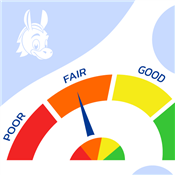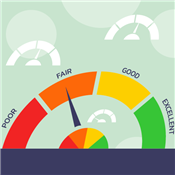Study: Average Credit Score
The average credit score is at an all-time high of 704. But scores vary for car buyers, new homeowners and even the young and old. How do you compare?
Your credit affects your entire life. A bad score can prevent you from owning a car or a home. Luckily, average scores are on the rise. Read on to learn more.
Average Credit Scores - How Do You Stack Up?
 |
- What was the average credit score in 2018?
The average credit score hit an all-time high at 704 in April 2018. Scores have increased increasing since 2009. - What is the breakdown of credit score ratings?
Credit scores range from 300 to 850. The full breakdown is as follows:
300-579 - Very Poor
580-669 - Fair
670-739 - Good
740-799 - Very Good
800-850 - Exceptional - What is the average credit score by age?
Statistics show that credit scores increase as we age. Here's a breakdown:72-92-year-olds: 730
51-69-year-olds: 700
33-52-year-olds: 655
22-40-year-olds: 634
21 and younger: 631 - What state has the highest average credit score?
Minnesotans have an average credit score of 709, the highest in the US, according to Experian. The state with the lowest credit score is Mississippi at 647.
Average credit score by state- Alaska: 668
- Alabama: 654
- Arkansas: 657
- Arizona: 669
- California: 680
- Colorado: 688
- Connecticut: 690
- District of Columbia: 670
- Delaware: 672
- Florida: 668
- Georgia: 654
- Hawaii: 693
- Iowa: 695
- Idaho: 681
- Illinois: 683
- Indiana: 667
- Kansas: 680
- Kentucky: 663
- Louisiana: 650
- Massachusetts: 699
- Maryland: 672
- Maine: 689
- Michigan: 677
- Minnesota: 709
- Missouri: 675
- Mississippi: 647
- Montana: 689
- North Carolina: 666
- North Dakota: 697
- Nebraska: 695
- New Hampshire: 701
- New Jersey: 686
- New Mexico: 659
- Nevada: 655
- New York: 688
- Ohio: 678
- Oklahoma: 656
- Oregon: 688
- Pennsylvania: 687
- Rhode Island: 687
- South Carolina: 657
- South Dakota: 700
- Tennessee: 662
- Texas: 656
- Utah: 683
- Virginia: 680
- Vermont: 702
- Washington: 693
- Wisconsin: 696
- West Virginia: 658
- Wyoming: 678
Credit, Cars, and Homes
- Alaska: 668
- What is the average credit score for car loans?
New car buyers boast an average credit score of 711. They have an average monthly payment of $493.Used car buyers have an average score of 649. Their average payments tend to lower: about $359 a month.
Did You Know? 86.9% of new car buyers financed their purchase, compared to 54.7% for those buying used cars. - What is the average car loan interest rate by credit score?
The minimum credit score that most lenders will accept is 500. Between 500 and 850, the average interest rates are:500-589: 15.24%
590-616: 14.06%
620-659: 9.72%
660-689: 7.02% - What is the average credit score for leasing a car?
The average lessee has an average credit score of 715. - What is the average credit score for a mortgage loan?
The average credit score on all closed loans for July 2017 was 724. This represents purchases and refinances.69% of purchase borrowers had a score higher than 700, compared to 65% for refinancers.
- What is the average credit score needed for renting an apartment?
Landlords prefer a minimum score of 600-620 for rental applicants.
Measuring Your Success
Knowing your credit score isn't enough. Next, you need to see how you compare to others.
- What is a good credit score?
In general, a score of 700 or higher is considered a "good credit score." Any scores above 750 are considered excellent. - Percentage of people in 830 credit score range?
About 20% of people have a credit score ranging from 800 to 850, according to FICO. Scores in this range are considered excellent, or super prime. - What is the highest possible credit score?
The absolute highest credit score on the Fair Isaac Scoring Model is 850. Just over 1% of the population has achieved this goal.200 million consumers have a credit score so this means less than 3 million have a perfect 850.
- What is the lowest credit score a person can have?
The absolute lowest credit score is 300. Luckily, according to TransUnion data, only 0.1% of the population with a credit score has a score of 300.Keep in mind, though, even a score as high as 550 could leave you without a loan. Lenders prefer credit scores of 620 before they consider loaning them money.
- How many credit bureaus are there?
There are three national reporting agencies: Equifax, Experian, and TransUnion. You may find other regional agencies.However, they all pull from these three main agencies. Correcting issues on your credit reports should be done with one of these three companies.
- What is the difference between FICO and VantageScore?
FICO scores were the only scores available until the last 10 years. Today, you may hear about VantageScore along with FICO. They both run on the same scale of 300-850, but they weigh factors differently.For instance, VantageScore takes late mortgage payments very seriously - they'll have greater impact on your score than any other late payment. The FICO model treats all late payments the same, no matter the type of debt.
How Credit is Calculated
- What makes up a credit score?
A credit score is about more than making your payments on time. It also measures:- How much of your available credit you use at once
- How much credit you apply for
- The age of your accounts (the older, the better)
- The types of credit you have (installment, revolving)
- How much of your available credit you use at once
- What is the difference between a soft and hard inquiry of your credit?
Each time a bank or lender pulls your credit, it shows up as an inquiry on your credit report. Too many inquiries and you could decrease your credit score. Not every inquiry counts, though.- A hard inquiry is the one that affects your credit score. This occurs when a lender is serious about lending you money. Future lenders and those that pull your credit can see the inquiry for 2 years.
- A soft inquiry does not affect your credit - it's more like a background check. As such, lenders don't need your permission for a soft inquiry. Those preapproval letters you get in the mail for credit cards? Those came about through soft inquiries.
- How many points will your credit score decrease for a hard inquiry?
Each new inquiry may cost you up to 5 points. Multiple inquiries at once could hurt your credit score. One or two stray inquiries probably won't do much damage. - Does shopping around for a car or mortgage loan negatively affect your credit score?
Every time you shop for a car loan or mortgage, lenders pull your credit. But multiple inquiries from the same type of lender may only count as 1 inquiry. The scoring systems take into account that most people shop around for the best deal.Buying your first home? Read our article for more information on how to prepare. - How does closing a credit card affect your credit score?
You might think closing a credit card is a good thing and it can be. But it also shortens the average age of your other accounts. This could slightly affect your credit score.But remember, you'll do more damage to your credit by maxing the card out than you would by closing it.
Why Your Credit Score Matters
- Which credit-scoring model do mortgage lenders use?
FICO and VantageScore continually come up with new scoring models. Today, FICO has Version 9 available. Mortgage lenders still use older versions of FICO, though.The only place you can see the score mortgage lenders use is by purchasing it from myFICO.com.
Read our article for more information on getting approved for a home loan. - What credit score model do auto lenders use?
Auto lenders use FICO Auto. This model takes credit card usage into strong consideration. They look at not only your balances, but also your habits over the last 2 years.They want to know if you pay your balances down/off. Lenders also look at your credit utilization rate.
- Does your credit score affect your insurance rates?
Studies show that there is a direct correlation between a low credit score and insurance claims. In other words, the lower your credit score, the more likely it is that you'll pay higher insurance rates. - Does your credit affect your chances of employment?
Some states, such as Illinois, California, and Washington, don't allow employers to pull an applicant's credit. In the states where it is allowed, some employers treat it like a background check. A small business owner's individual credit score can also affect them when attempting to apply for a business credit card.Basically, they want a sense of your reputation. If you have a lot of collections or bankruptcies, you may not be reputable enough for the job.
- How does bankruptcy affect your credit score?
Bankruptcy may cause your score to drop by 120-130 points, up to as many as 200. Publicly-declared bankruptcy will impact your score for 7-10 years.It would take roughly 5 years for someone with a 680 score to earn back the lost points, according to FICO.
- How can you improve your credit score?
So you know you need good credit to get a loan. Luckily, there are ways you can increase your score if it's low:- Pay your bills on time
- Take care of any incorrect information reporting on your credit report
- Decrease your credit card balances
- Pay off any installment loans you can afford to pay off
- Watch how often you apply for new credit
- Keep a good mix of revolving and installment debt
For more information on building up your credit, check out our article here. - Pay your bills on time
- How can you get a copy of your credit report?
You have access to one free report from TransUnion, Equifax, and Experian each year. You can only access it at AnnualCreditReport.com.TIP: Consider request one report from each agency every 4 months. You can monitor your credit for an entire year this way.If you prefer constant reports of your credit score, consider Credit Sesame.
- How often should you check your credit report?
At a minimum, you should take advantage of the three free credit reports every year. This helps you stay on top of any errors that could negatively affect your credit. - Should a person's credit score affect your decision to date them?
You might not ask your date for his credit score, but it could inadvertently affect who you marry. Studies show that people with higher credit scores tend to have the strongest marriages. It goes without saying: you marry a man (woman), you marry their finances.
The Bottom Line
Your credit score is a work in progress. You'll have highs and lows but try to find a balance. Stay on top of what the bureaus report about you. It can affect many areas of your life.
Sources and References:
Write to Kim P at feedback@creditdonkey.com. Follow us on Twitter and Facebook for our latest posts.
|
|
|










